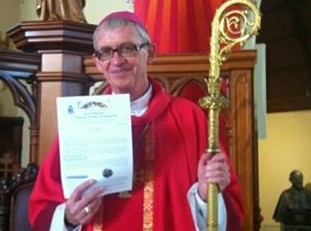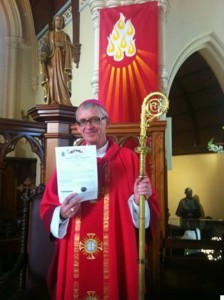by ROWENA OREJANA
AUCKLAND — Parishes in Auckland started the launch of Fit for Mission, a grassroots diocesan pastoral plan, on Pentecost Sunday. The plan calls for Catholics to look outside their own
churches and spread the Good News in the suburbs they live in.
The leader of the diocese’s Pastoral Services Group, Pat Lythe, said Bishop Patrick Dunn will not be launching the plan himself, so that parishes get to own their mission.
“He wants the parishes to launch it themselves, because it’s there on the ground where it’s going to happen,” she said.
The bishop, though, gave the parishioners great encouragements. In his address to the congregation at St Patrick’s Cathedral’s own launch at Sunday’s 11am Mass, Bishop Dunn said that Catholics often think of Mission as something for missionaries, those who have left New Zealand to work overseas, or those who have come from other countries to work here.
“This cross fertilization is always enriching, a reminder to us that the Church is universal,” he said. “But this call to mission applies to each one of us. Jesus said, ‘As the Father has sent me, so am I sending you…..receive the Holy Spirit.’ In leaving Mass each Sunday, nourished by Word and Sacrament, we hear the command in the dismissal rite to go and announce the gospel and glorify the Lord in our lives, to advance the reign of God, to continue the mission of Jesus.”
Mrs Lythe said parishes need to decide what are the needs of the suburbs. “And it’s not about the Catholics. It’s about the suburb that surrounds the church and what we can do to serve the suburb,” she said.
Mrs Lythe explained that the past two diocesan plans were inward-looking. “They were all about things inside the Church, like parish leadership, development of vibrant parishes, youth,”
she said. “It was time for mission.”
On the parish level, people need to work on programmes that are sustainable and relational. “It’s not just about giving money, but it is about developing relationships with people,” she
explained.
She said the other parts of the pastoral plan include leadership, shared pastoral areas and communication.
“They are not as important at the moment. It’s all about mission,” she said.
The parishes are expected to report to the diocese about their programmes and how they are sustaining them.
Those stories will be put in a newsletter to give the other parishes ideas on how to implement their projects.
After implementing their projects, each parish will reach out to other parishes, schools or ethnic communities to carry out joint projects.
As individuals, Mrs Lythe said people need to stand up and be proud of their faith. “It’s actually quite difficult for Kiwis to talk about their faith really. So, that’s going to be the first challenge, I think,” she said.
She said Kiwis have a hesitancy about proclaiming the faith. It stemmed from being a persecuted minority in the distant past. “Even though we are not persecuted for it now, we still tended to keep it quiet,” she said.
Mrs Lythe said it helps that people from the ethnic communities are openly, actively Catholic.
She said parishioners are not expected to go onto street corners and preach. But they are expected to let their friends and colleagues know that they are Catholic.
“Once you let people know you’re Catholic, you have to live up to your Catholic principle,” she said.
She said simple things can accomplish this task, like making the sign of the cross before a meal at a public place, or offering to pray for a friend or saying “God bless” instead of “goodbye”.
She added people don’t need to know the answers to deep theological questions, because they can always refer those questions to the parish priest. “We don’t actually have to know
the answers. We just have to know why we’re doing it: because we love God and God loves everyone. That’s what the important part is really,” she said.
By the end of the pastoral plan, Mrs Lythe hopes that, “everybody feels free to share the fact that they are Catholic and to share their faith with other people”.
She pointed out there are 40,000 Mass goers in the diocese. “If each person only influenced four people, it would be a huge outcome. We’re not expecting those four people to become
Catholics, but we are expecting them to know about Jesus, about Christians, about Catholics and to know the message: God loves us and we love God,” she said.
Bishop expressed his hope is that every person, every parish, every community, every school will look outwards, beyond their own communities to ask ‘Where are the poor, where are people who are suffering in any way and how can I help?’
He affirmed the many ways in which some are already doing this. “We will now be asking every parish and school community to identify one project that they will undertake to serve the wider community and to share and encourage others to do likewise,” the bishop said.
Bishop Dunn said that Pope Francis constantly reminds us that we cannot be part-time Christians. He quoted Pope Francis who wrote as follows in his Apostolic Exhortation, Joy of the Gospel. ‘I prefer a Church which is bruised, hurting and dirty because it has been out on the streets, rather than a Church which is unhealthy from being confined and clinging to its own security.’
The bishop said that each one of us is the Church. Therefore when we are “out on the streets” we are truly advancing the missionary work of Jesus.
He prayed that the Holy Spirit will inspire everyone in the diocese to be on mission and witness to the gospel in their homes, workplaces and in all their activities.


Reader Interactions